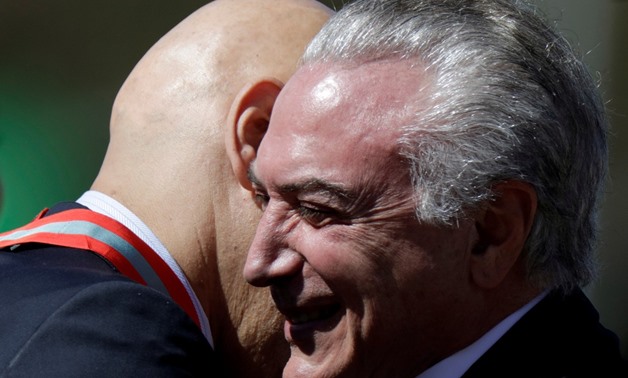
Brazilian President Michel Temer in a ceremony of the 152nd anniversary of the Riachuelo Naval Battle in Brasilia -Reuters
Brasília - 10 June 2017: Brazilian president Michel Temer rode to power last year by helping get his ex-ally Dilma Rousseff impeached, but he's been embroiled in corruption scandals ever since.
Here are five key chapters from a tumultuous 14 months culminating with Friday's court decision not to scrap his mandate because of undeclared donations and bribes in the 2014 presidential election.
Rousseff's vice president Temer temporarily replaced her as head of state on May 12, 2016, after the Senate voted to hold an impeachment trial over charges that she broke government accounting rules.
The leftist leader was finally dismissed on August 31 and the conservative Temer took full office to see out the mandate to late 2018, launching austerity reforms to fix the stricken economy.
Three of Temer's all-white, all-male cabinet were fired or resigned between May and June 2016 over a vast corruption scandal linked to the state oil firm Petrobras. They were the first of a slew of casualties from Temer's inner circle as investigators with the "Car Wash" operation closed in.
Another key ally, the former lower house of congress speaker Eduardo Cunha, would be jailed in March 2017 for taking bribes. He had been the main driver of the Rousseff impeachment.
Temer says his main priority is austerity reform to whip Brazil's economy back into shape and exit a two-year recession. On December 13, 2016 Congress approved a 20-year public spending freeze, a central plank in the unpopular policy.
However, other pending measures to tighten pensions and loosen labor laws risk being disrupted by Temer's latest legal problems.
"Car Wash" action ramped up in April 2017, when the Supreme Court authorized prosecutors to probe more than 80 senior politicians for corruption based on allegations made in plea bargain testimonies.
The accused include eight ministers, 29 senators, 40 lower house deputies and three governors, many of them close to Temer.
On May 17, the O Globo media group published a recording of Temer supposedly discussing the payment of hush money to the jailed Cunha.
Temer denies wrongdoing and refuses to resign. But on May 19, the Supreme Court authorized an investigation into suspected corruption and obstruction of justice.
Temer got one break, however, when the electoral court decided Friday to acquit him of charges that he and Rousseff won their 2014 election on the back of corrupt donations.

Comments
Leave a Comment